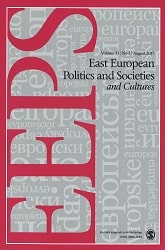“Capital of Despair”. Holodomor Memory and Political Conflicts in Kharkiv after the Orange Revolution
“Capital of Despair”. Holodomor Memory and Political Conflicts in Kharkiv after the Orange Revolution
Author(s): Tatiana ZhurzhenkoSubject(s): Civil Society, History of ideas, Political history, Government/Political systems, Interwar Period (1920 - 1939), History of Communism, Politics of History/Memory, Politics and Identity, Peace and Conflict Studies
Published by: SAGE Publications Ltd
Keywords: politics of memory; Holodomor; Kharkiv region; Ukraine;
Summary/Abstract: The Great Famine of 1932–33, known in Ukraine as the Holodomor and silenced for decades by the Soviet regime, holds a special place in national memory. It was after the Orange Revolution that the Holodomor became the core of a new identity politics, which conceptualized the Ukrainian nation as a “postgenocide” community, a collective victim of the Communist regime. But the official interpretation of the Famine as a genocide met ambivalent responses in the regions. While formally complying with the official political line, the regional political elites in Eastern and Southern Ukraine often refused to accept the official interpretation of history and sabotaged orders coming from Kyiv. The present article focuses on the official commemoration of the seventyfifth anniversary of the Holodomor in Kharkiv, the former capital of Soviet Ukraine and epicenter of the famine. The “memory wars” in Kharkiv during 2006 to 2009 have revealed more than just tensions between the center promoting a new national identity and a reluctant “Sovietized” region adhering to its political mentality and commemorative culture. In fact, the official narrative of the Holodomor as a genocide and the corresponding memory regime have been contested, renegotiated, and modified on the regional level, through the conflicts and the bargaining of the local political actors. The borderland identity of Kharkiv, its geographic proximity to Russia, added an international dimension to the local memory wars as the Holodomor issue became a stumbling block in Ukrainian-Russian relations.
Journal: East European Politics and Societies
- Issue Year: 25/2011
- Issue No: 03
- Page Range: 597-639
- Page Count: 43
- Language: English
- Content File-PDF

